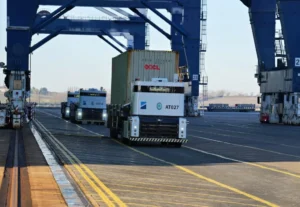A newly introduced bipartisan bill will grant the Federal Maritime Commission (FMC) the power to block anticompetitive agreements among ocean carriers and marine terminal operators.
The proposed bill, the Ocean Shipping Antitrust Enforcement Act (H.R.2710), would allow the FMC to ensure that any agreements between these entities are not unreasonably anticompetitive.
This aims to address the current problem in which the FMC cannot block such agreements without first obtaining a federal court order, which can be time-consuming and inefficient.
READ: Carriers to undergo monitoring by FMC as profits keep surging
The bill is the result of a request made by Federal Maritime Commissioners Max Vekich and Carl W. Bentzel in December 2022.
The U.S. House of Representatives said its goal is to ensure that the FMC can fully enforce the law and promote fair, competitive markets in the ocean shipping industry, which has been dominated by nine foreign-flagged ocean liners that openly collude under three carrier alliances handling some 80 per cent of cargo.
According to Congressman John Garamendi, who introduced the bill: “Congress must ensure that the FMC can do its job and fully enforce the law. Americans expect fair, competitive markets with good government, and that is exactly what our bipartisan bill would ensure.”
READ: FMC mandates new criteria for carriers’ refunds
The bill has received support from Federal Maritime Commissioners Vekich and Bentzel, who believe that the FMC is best positioned to make the initial determination on whether an agreement is anticompetitive.
“This legislation provides a vital fix because while the FMC already has an active monitoring programme for these agreements, this legislation will provide the authority necessary to challenge an anticompetitive agreement and allow the FMC to work constructively work toward resolutions, making this a much more efficient and accountable process,” said Bentzel.
This new bill builds upon the bipartisan work of Representatives Garamendi and Dusty Johnson over the past two years to reform the ocean shipping industry and better protect American businesses and consumers from price gouging by foreign-flagged ocean liners.








